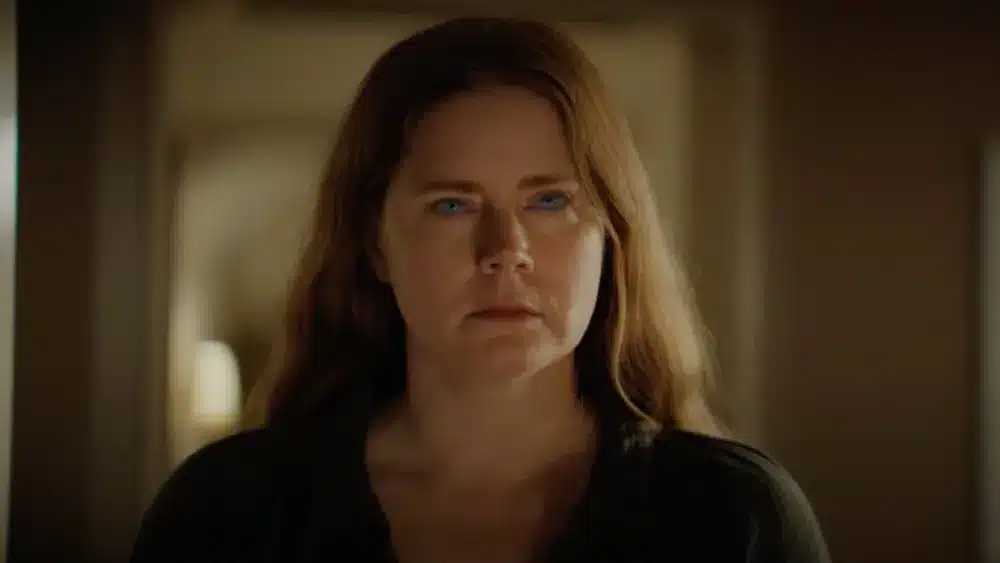




Wri/Dir: Marielle Heller | Cast: Amy Adams, Scoot McNairy, Arleigh Snowden, Emmett Snowden, Jessica Harper | US 98′
Amy Adams’ character in Nightbitch is a stay-at-home mum, looking after a planned child in a well-appointed suburban house. But she hasn’t reckoned with the effect on her psyche of 24/7 life with a toddler while dealing with an inattentive, mostly absent husband. She feels her IQ shrinking by the day, and her identity – bound up with her now-stalled, but previously burgeoning, career as an artist – dissipating.
Facile musical afternoons at a local library and encounters with uninspiring women with whom she has little in common other than the brute fact of motherhood only increase her frustration. Not even comfort food, in the form of chunky fritters fried in great dollops of butter (Adams has bulked up considerably for the role), seems to help.
And as her anger builds, she notices that it is accompanied by some strange physical changes: thick hair sprouting on her back, rows of teats on her torso, even the beginnings of a tail…
Dogs and wolves have frequently been used in stories to illustrate the wild or unbound side of human nature – which is perhaps strange, given the rigidly hierarchical, pack-based nature of canine social organisation. The figure of the werewolf looms large here. In films like The Company of Wolves and Ginger Snaps it serves as a metaphor for the rawness of female adolescence; in Wolf, as a tonic for the diminishing powers of an ageing literary editor, played by Jack Nicholson.
But Nightbitch isn’t by any means a werewolf film, or really a horror film at all. There’s no sense that Adams’ character has been infected with a supernatural curse, or otherwise inducted into a lineage of monsters. She’s never shown to be a danger to anyone else, least of all her son, with whom she’s unfailingly sweet – no matter how many provocations the narrative hurls at her – and writer/director Marielle Heller mostly downplays the tale’s few weird or gory moments.
The story feels more like a slice of magical realism – the kind of thing which, in their wilder moments, a John Updike, John Cheever or Donald Barthelme might have come up with as a metaphor for suburban angst.
The three major characters are nameless, suggesting that Heller is aiming for an exemplary or prototypical picture of the nuclear family, as seen from “Mother’s” perspective: a point-of-view signalled by the preternaturally careworn Scoot McNairy’s designation as “Husband”, rather than the more standard pairing of “Father”.
The narrative is carefully slanted in Mother’s favour, and doesn’t delve into the privilege at work in her choice to take time out of her career for her child’s formative years – and still to feel radically discontented. And, typically of US cinema, her relatively opulent house is almost assertively antiseptic: a show-home rather than a place where people actually live, with little human grain, much less the scruffy or bohemian touches one might associate with an artist.
To call the scope of the film limited would be to undermine its strongly expressed core message: that the battles, victories, defeats and sacrifices played out by women at the domestic level are not just visceral and atavistic, but the very foundation of human life. However, the story doesn’t find a way to escalate its concerns into something truly compelling, and its third act is mostly concerned with the successful balancing-out of Mother’s relationship with Husband rather than anything more dark or gripping.
Having said this, the relationship between Mother and the hugely charming Son (actually played by twin brothers Arleigh and Emmett Snowden) is one of the joys of a film which also provides a generous amount of laugh-out-loud comedy. The playful bond between them is so palpable that I wasn’t the only person at my screening who wondered whether Son was in fact Adams’ own child. Adams’ performance is superbly nuanced, and to be relished. Where others might have chewed the scenery, she signals oceans of exasperation with the subtlest tilt of her head and lift off an eyebrow. @_i_a_n_l_o_n_g
SCREENING AT VIENNALE 2024 | IN UK CINEMAS 6
Ian Long is a screenwriter and story consultant, and runs workshops on the ‘Deep Narrative Design’ of storytelling.